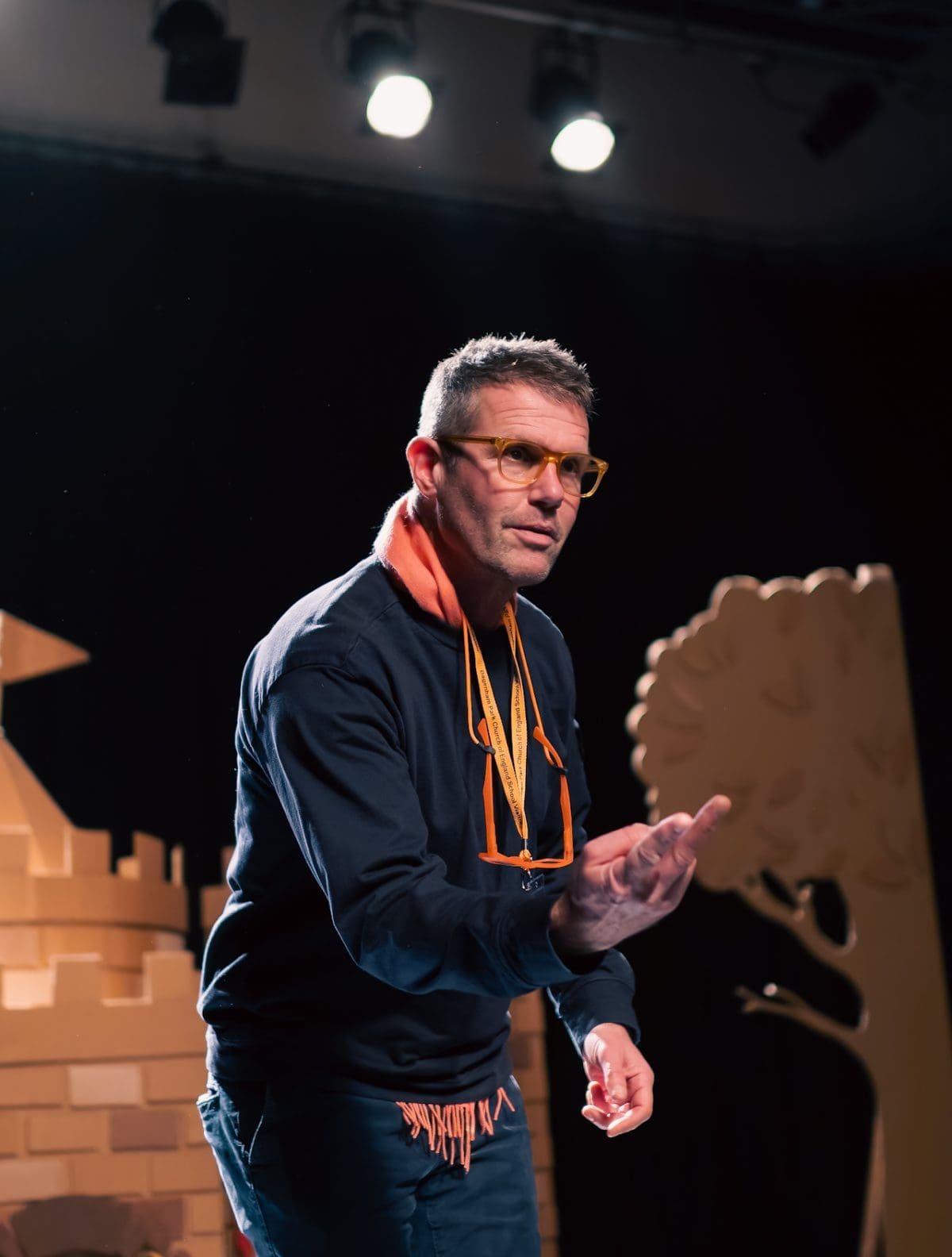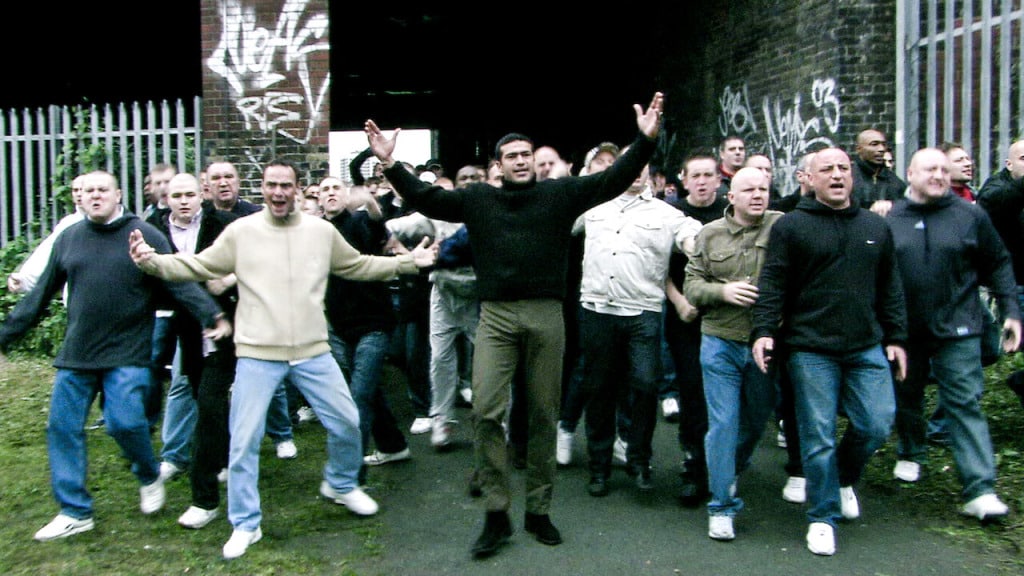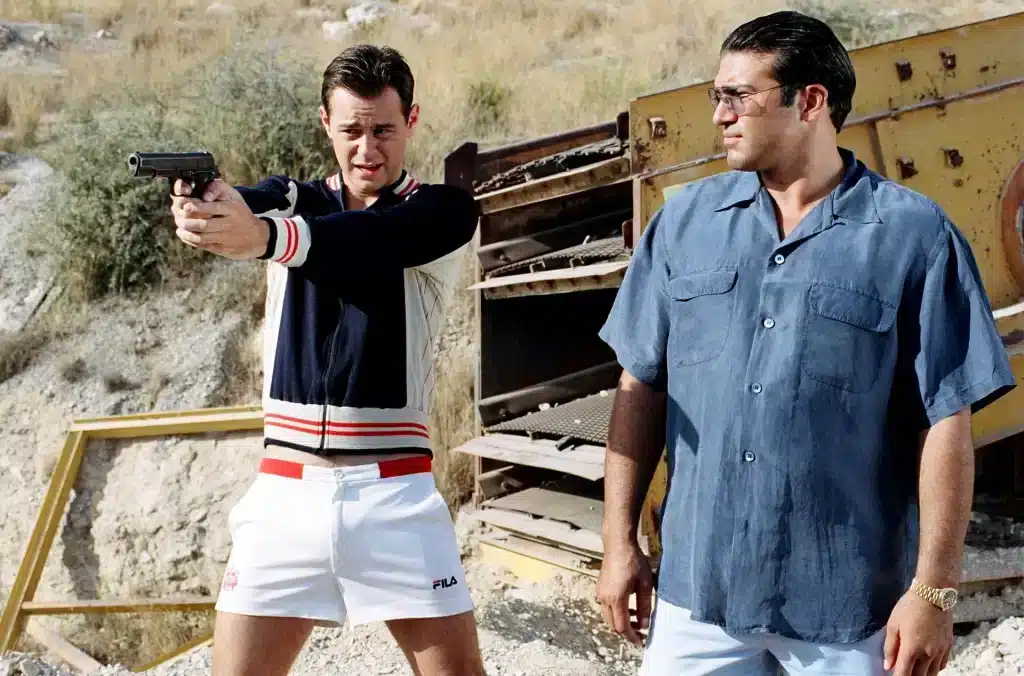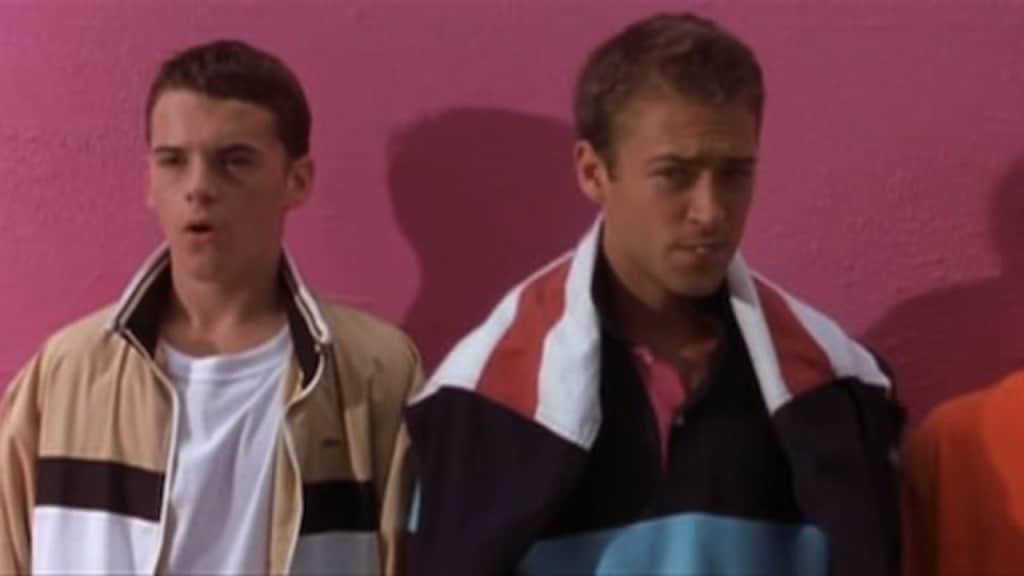
I can’t see Nick Love over the phone, but it’s not hard to picture a man who is known for a year -round tan, and built like a boxer. Against the South London patter which Love assures me is anything but ‘Mockney’, the 53 year old director has a disarming vulnerability: one that’s earned him the accolade of a BFI Retrospective on Working Class Masculinity for Football Factory. It’s an early film on football hooliganism that’s just one of the many worlds Love has lived through.
Produced by Rockstar in 2004, starring the then unknown Danny Dyer, Football Factory is a lads mag classic—an unfiltered, testosterone heavy look at football hooliganism that’s about as frantically-paced as an upper.

But despite the new BFI retrospective, it’s also a film that once made Love feel like the “scum” of his industry. Launching in the noughties, Love’s film arrived in an era where press could dress up snobbery as taste. When the media attacked the film’s light touch on violence and hooliganism, Love, twenty years younger, came out fighting. “If someone watches a film for 90 minutes and wants to go out and batter someone,” Love would argue in a television news programme in 2004, “then I think they probably wanted to batter someone anyway.”
Today, Love admits he gets the press backlash. But he hasn’t changed his stance about the snobbery. “If I have celebrated those cultures,” he tells me, speaking from his hotel room in France, “which I’m not saying I have,” he adds quickly, “it’s because I know enough about them to know they’re not all doom and gloom.” Amused by the notion he ever captured a moment (Love is effectively immune to any pretentious compliment), he says it was just a reflection of his own experiences. He finds it surreal it’s arrived in the good graces of the BFI.
“Obviously there’s no such thing as good football violence,” Love continues, calling out the university educated press for being out of touch with ordinary viewers. “But why is it that the film media wrote about that movie, they said it’s the worst thing they’ve ever seen? And yet when it came out, young men up and down the country were like ‘Finally, something we can relate to.”
So what changed the reception?
“Time.” Love repeats the word again like a talisman. “It can do incredible things.”
Love’s upbeat tone is a curious paradox. Behind the bravado, Love is a very sensitive man—he wore pink to the Millwall ultra games his football movie honours, and says, with pride, his films often seem to have homosexual undercurrents around male belonging. I’m “as camp as you can get without being gay” he tells me (not that he has a problem with it). But citing his movie DNA as stemming from the tough-guy filmmakers Scorsese, Alan Clarke and Quentin Sorrentino, what’s confusing is if you turn the clock back 40 years, it’s not only unlikely Love would be talking movies, or having tea in the BFI—it’s a small miracle he’s still standing.
“I’ve got odd roots,” Love explains. From the age of five, he grew up with a single middle-class mum with socialist values in a South London council estate. Living off free clothes and school dinners, Love was poorer than his peers, bullied in school and abused in Club Scouts. By the age of 9, he’d hidden his middle-class upbringing by becoming a “chameleon” to fit in, often playing harder than he was to do so. It’s an imposter syndrome, and a dose of vulnerability, that you’ll find across Love’s films from Goodbye Charlie Bright to The Business. It’s also a tragic formula: by the time Love directed Football Factory, he was seen as the hardman, with the hard life, directing movies that weren’t soft enough to fit in.
Whether it’s remaking Alan Clarke’s The Firm around the odd one out in the gang, or any of Danny Dyer’s unlikely strongman performances, Love’s heroes often identify as an outsider acting hard. So it’s a surprise when he tells me that as a kid, when his peers started taking drugs, Love took it further than any of them. “I was very, very interested in hard drugs early,” Love tells me. Then comes the aside. “And crime.”
There’s a laissez-faire attitude to much of Love’s early life; one, Love suggests without any bitterness, that was perhaps a consequence of his mother’s liberal reluctance to punish him. Never told to come home, Love’s first arrest was for breaking phone boxes with friends when he was 12. By 13, it was hard drugs. W “Beyond my parents, everyone I knew was a criminal,” Love says. Across his early teen years across South London, drugs, crime and football were the main hobbies—and barbiturates, robbing and Millwall were among his first loves.
“I took a couple of bad beatings,” Love tells me with a mix of pride then regret. “I got caught robbing a car one night. I was out my head so I tried to fight the guy in his car—it was my fucking fault completely.” It was a “savage” fight, Love admits, one that would take him months to recover from. He describes the lowpoint casually: waking up, broken, looking at his face, and thinking ‘Thisis fucking heavy.’
The lifestyle would escalate—but as a young addict, Love admits he didn’t have much of a marker for how fast things were spinning out. From smoking gear in stairwells,robbing to later signing up for electroshock therapy, Love keeps a quick patter around the teenage years of his life. Being a street addict was a time he likens to a warzone, and as the director circles around the drug-related death of a close friend Nikki, I notice Love never uses the word addict in the past-tense.
What saved him? Dealing with regular overdoses and facing 7 years in an adult prison for firearm charges, drugs and robbery, Love chose to go clean. With a repsheet that would make any of his characters weep, he was sectioned in the Maudsley Hospital at 17: “I got nutted off—which happened to be a good thing as it turns out,” Love laughs. Despite the humour, it’s not only being sectioned which triggered the recovery, but frank advice from his probation officer. “I don’t like preaching,” Love tells me. “The people who had the most impact on me are the ones that shared their experience with me—who wore it lightly.” Luckily, Love’s officer was one of them.
That light touch lets me understand Love’s frank attitude around his past. But it adds a paradox around his films. Having spent his teenage years forged by addiction, a large part of Love’s adulthood is formed by counselling and helping addicts like himself. But if you take one look at his films—from drug ringing in The Business to an upcoming comedy on cocaine titled Marching Powder (starring Danny Dyer)—it’s hard to see any part of his professional work landing in a Drug’s Awareness Course.

“I think most people really are contradictions, aren’t they?” Love admits. “They’re juxtapositions of different sorts of characters.” Against the sensitivity, there’s an honest acceptance to Love, tanned and laughing, that feels unshakeable. I ask him if has a mental block about tackling addiction in his work. “Maybe addiction is something I’ll come back to when I’m older. But I don’t like seeing depressing entertainment. I like seeing entertaining entertainment.”
Good film, to Love, is feeling. “Rage is a feeling,” he says, “fear is a feeling. When I hear a film is a ‘visual delight’ I think, ‘Ah, what the fuck does that mean?” There’s no pretension in Love’s delivery, and little, like Football Factory, that’s not authentic. It’s what made Football Factory so anaemic to critics, and still so fun to watch today. From Dyer’s character imagining calling a courtroom of lawyers a bunch of paederasts and cunts, to getting the shit kicked out of you for the hell of it, Love’s film has the tempo of a more or less ordinary round of stories at your local.
Building up from his indie drama Goodbye Charlie Bright the year before, Love’s cast for his second feature film Football Factory were the same mates he’d go to football fights with, genuine “thugs” across Millwall and Chelsea with a head of casting so “notorious no one would dare fuck around.”

Soft-faced, fresh from acting school (and a future darling of Harold Pinter), Danny Dyer arrived as an outsider.d He was “just another fucking face” for Love’s old school friends who he’d cast. Most actors would have found the experience “incredibly fucking uncomfortable.” But when Dyer was “clamped” by a stray punch in the film, it’s like he’s gone through the gauntlet of Love’s early life: “He wasn’t up in arms,” Love praises, “he wasn’t precious. He took on for the team. He’s great like that, Danny.”
Love is quick to play off the off-side hit with a laugh. But if there was a disconnect between the director’s version of the movie and the press reception, it’s because it’s personal. Dyer got stuck into Love’s world without a fuss. But the press couldn’t accept a working class movie that was happy to be entertaining over preaching a message. Twenty years on, Football Factory launched a collaboration between Dyer and Love that defined both their careers—and the strange combination of violence and bravado, one that critics once hated, is getting a new spot in the limelight.
It’s not always an easy return however. At the end of the interview, Love, who has swapped living in council estates for country houses, tells me bluntly: “Because of my films, I’ve made lots of friends with gangsters.” Finding a likeness with the fictional Dyer stand-in, Love explains, happily, that he’s been out of his depth at times. He prefers the culture as it is today: where masculinity doesn’t have to be performative. It suits him well. Because when things heat up, Love’s humour always hides the same quiet sensitivity. “When you see a proper fucking hood go about their business,” Love says, pausing, “it really is fucking terrifying.”



